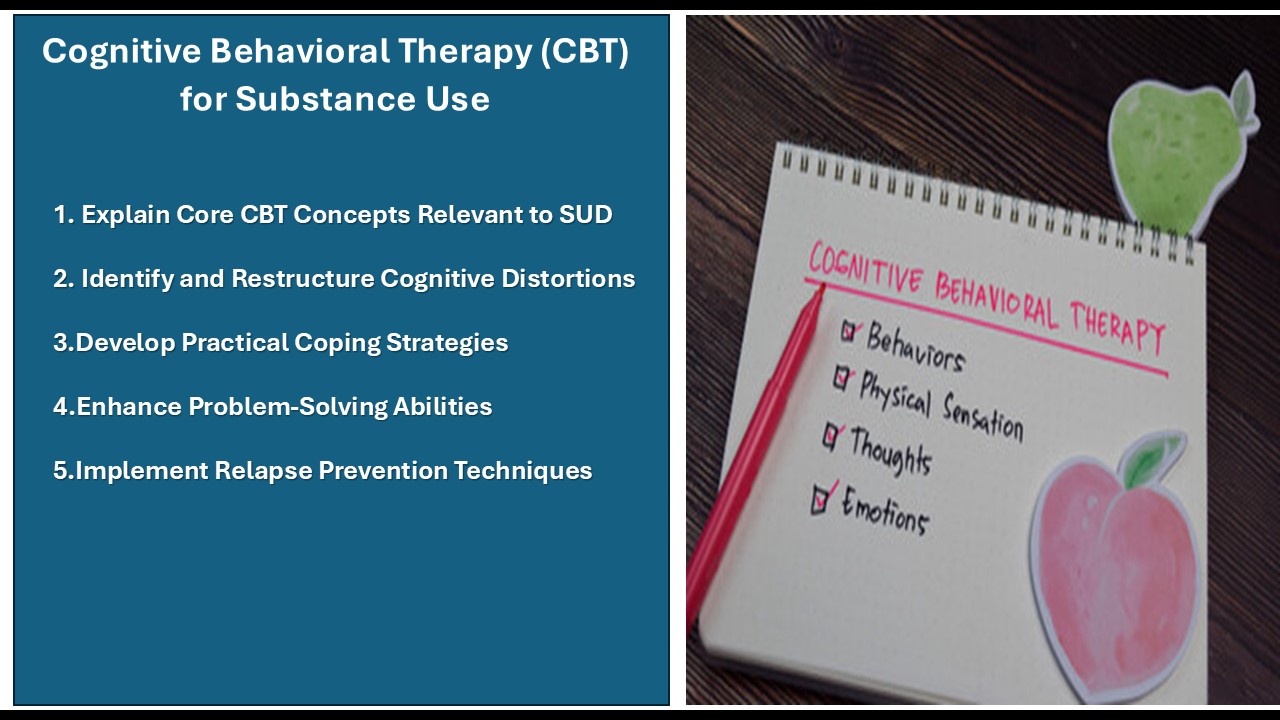An evidence-based psychotherapeutic approach that helps individuals recognize and change maladaptive thought patterns and behaviors contributing to substance use disorders.
Cognitive Behavioral Therapy (CBT) for Treating Substance Use Disorders:
Training Description:
This training
outlines how Cognitive Behavioral Therapy principles can be applied to identify and restructure
unhealthy thought patterns, develop coping strategies, and enhance problem-solving skills in
clients with substance use disorders. This training includes a breif introduction to relapse prevention techniques
designed to anticipate high-risk situations. Counselors who complete this training gain
practical tools for helping clients modify thought and behavior patterns that contribute
to continued substance use
- Explain Core CBT Concepts Relevant To Treating Substance Use Disorders
- Identify and Restructure Cognitive Distortions In Substance Use
- Develop Practical Coping Strategies to Strengthen Clients’ Ability to Cope With Triggers and Cravings.
- Enhance Problem-Solving Abilities For Life Stressors, and Challenges Which Contribute to Continued Substance Use.
- Integrate CBT Into Individualized Treatment Plans
Course Learning Objectives
This is a web-based self-paced training which provides 2 hours substance specific
board approved hours. The content for this project has been curated or developed by author Michael Daniels
MSW, LCAS, CCS, LCSW and other many amazing professionals who have donated their expertice and time to
ensure practitioners entering the addiction profession have access to quality trainings without barriers
of finance and access.
Receiving Credit: In order to receive credit for the training you must complete the interactive question within
the training. If you do not complete the embedded quizes, when you get to end of the training you will not
receive credit until you complete the embedded quiz questions. In Addition, you must complete the
50 item quiz at the end of the training and receive at least an85% before receiving your certificate. You do have
the option of retaking the quiz until you reach the approved score. Once you submit your quiz, you will receive
your certificate with in 24 hours.
Inaccurate or irrational thought patterns that contribute to negative emotions and maladaptive behaviors, often reinforcing substance use.
Immediate, involuntary thoughts that arise in response to situations and influence emotions and behaviors, sometimes fueling substance use.
A core CBT concept that explains how thoughts influence emotions, which in turn drive behaviors, including substance use.
A CBT technique used to identify, challenge, and replace irrational or harmful thoughts with more balanced and realistic ones.
A strategy that encourages engaging in positive and meaningful activities to improve mood and reduce reliance on substances.
Practical skills such as mindfulness, relaxation techniques, and problem-solving methods used to manage stress and cravings.
Internal or external cues that provoke cravings or urges to use substances, including stress, social settings, or emotional distress.
Intense urges or desires to use a substance, often triggered by certain thoughts, emotions, or environmental cues.
TA CBT-based approach to identifying high-risk situations, developing coping skills, and creating safety plans to sustain recovery.
A CBT tool used to examine the antecedents and consequences of substance use to better understand and modify behavior patterns.
A structured CBT approach that helps clients develop effective strategies for addressing life challenges without resorting to substance use.
The practice of tracking thoughts, emotions, and behaviors to identify patterns and triggers for substance use.
A therapeutic approach integrating mindfulness techniques with traditional CBT strategies to enhance emotional regulation and coping.
The adaptation of CBT techniques to treat individuals who have both substance use disorders and mental health conditions, such as anxiety or depression.

Below you will be able to access the training
- Course Introduction (10 minutes)
- Defining SBIRT & Its Purpose (15 minutes)
- Module 2: Core Components of SBIRT (20 minutes)
- Module 3: Rationale and Evidence Base for SBIRT (15 minutes)
- Step-by-Step SBIRT Implementation (30 minutes)
- Tailoring SBIRT for Diverse Populations (20 minutes)
- Course Wrap-Up & Final Assessment (10 minutes)
Additional Resources Related To This Training
Concepts of CBT and Strengths-Based Approaches to Addiction
Articles Related To This Training
- The Effectiveness of Cognitive Behavioral Therapy Techniques for the Treatment of Substance Use Disorders
-
An Evaluation of Cognitive Behavioral Therapy for Substance Use
Disorders: A Systematic Review
and Application of the Society of Clinical Psychology Criteria for Empirically Supported Treatments. - Cognitive-Behavioral Therapy for Substance Use Disorders
- Understanding eHealth Cognitive Behavioral Therapy Targeting Substance Use: Realist Review
- Group Cognitive Behavioral Therapy for Substance Use Disorders Among Psychiatric Inpatients : An Intervention for Opioid Misuse
Contact: Michael Daniels: Email: danielsm@ecu.edu: Phone: 252 7372117 for any technical questions
Editorial Disclaimer: Although all information contained in each training is based on validated research, any opinions expressed are those of the author's alone, and do not reflect
the opinions of affillate agencies. Although each training has an NCASPPB approved number, they
are not responsible for the content.